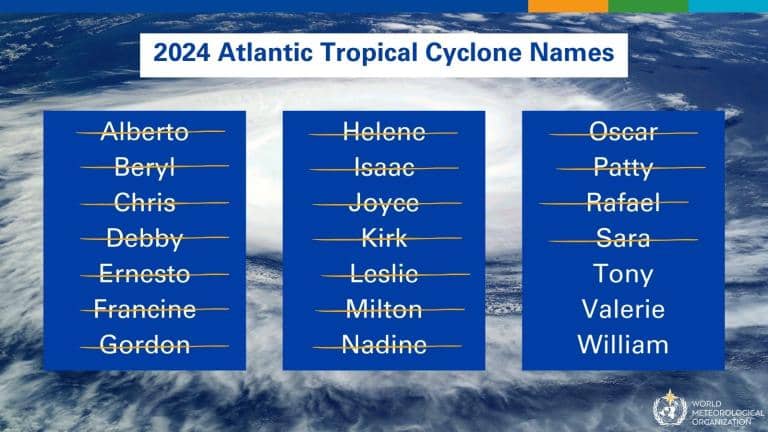
The active 2024 Atlantic hurricane season officially ends on 30 November, having left a trail of devastation, casualties and massive economic losses.

NOAA’s GOES-16 satellite captured Hurricane Helene as it approached Florida at 3:51 p.m. EDT on September 26, 2024.
NOAA Satellites
Three hurricanes, in particular, were especially destructive. Hurricane Beryl was the earliest Atlantic basin Category-5 hurricane on record, with major impacts in the Caribbean. Hurricanes Helene and Milton caused catastrophic damage in the United States.
The Atlantic basin saw 18 named storms in 2024. Eleven of those were hurricanes (winds of 74 mph or greater) and five intensified to major hurricanes of category 3, 4 or 5 on the Saffir Simpson scale, with winds of 178 kmh/111 mph or higher, according to the US National Oceanic and Atmospheric Administration (NOAA).
It was the ninth successive season with above average activity. An average season produces 14 named storms, seven hurricanes and three major hurricanes.
The Atlantic hurricane season lasts from 1 June to 30 November and is carefully monitored by the World Meteorological Organization Tropical Cyclone Programme.
“Year after year, the climate crisis continues to break new records, resulting in more extreme weather events, including rapidly intensifying tropical cyclones, intense rainfall and flooding,” said WMO Secretary-General Celeste Saulo.
“This July’s Hurricane Beryl, the earliest Category 5 hurricane on record, left a trail of destruction across the Caribbean. Despite its ferocity, the hurricane resulted in fewer deaths compared to previous ones. This was thanks to advances made by the countries of the region in strengthening their early warning systems,” said Celeste Saulo.
Between 1970 and 2021 tropical cyclones (the generic term which includes hurricanes) were the leading cause of both reported human and economic losses worldwide, accounting for more than 2 000 disasters.
However, the death toll decreased from more than 350,000 in the 1970s to less than 20,000 in 2010-2019. Reported economic losses in 2010-2019 were at 573.2 billion dollars.
Early warnings by the WMO community and improved disaster risk management have dramatically reduced fatalities, but economic losses are rising. In the USA, four hurricanes caused losses of more than one billion dollars this year, whilst Small Island Developing States in the Caribbean still suffer disproportionately.
This is why WMO and its partners have prioritized early warning action in small islands under the international Early Warnings For All initiative.

2024 Atlantic Tropical Cyclone Names – November 2024
The record-setters
The 2024 season started off intensely, but then there was a lull at the height of the season in August. The particularly intense winds and rains over Western Africa created an environment that was less hospitable for storm development, according to NOAA.
Twelve named storms formed after the climatological peak of the season in early September. Seven hurricanes formed in the Atlantic since September 25 — the most on record for this period.
Hurricane Beryl was the earliest Atlantic basin Category-5 hurricane on record. Beryl hit the southern Windward Islands at Category 4 strength on the Saffir Simpson scale on 1 July. It made a direct hit on Grenada and had major impacts on St Vincent and Grenadines – small islands with little experience in coping with a category 4 hurricane.
At its peak, Beryl was a top-ranked Category 5 on the Saffir Simpson scale. It was at major hurricane intensity while it passes near Jamaica and the Cayman Islands. It then moved towards the East coast of Mexico’s Yucatan Peninsula.
Hurricane Beryl made landfall in the United States of America on 8 July.
Hurricane Helene made landfall as a Category-4 storm on the Florida Gulf Coast on September 26. The storm caused catastrophic flooding across the southern Appalachians, widespread wind damage from the Gulf Coast to the North Carolina mountains and storm surge flooding along portions of western Florida. Preliminary data indicate that Helene was the deadliest hurricane to affect the continental U.S. since Katrina in 2005, with more than 150 direct fatalities, the majority of which occurred in North Carolina and South Carolina.
Hurricane Milton made landfall as a Category-3 near Siesta Key, Florida, on 9 October and resulted in a tornado outbreak that produced 46 tornadoes and caused torrential rainfall and localized flooding. Milton’s rate of rapid intensification was among the highest ever observed.
The 2024 Pacific Hurricane Season
Hurricane season activity was below-normal for both the eastern Pacific basin and central Pacific basin and fell within predicted ranges, respectively.
The eastern Pacific basin hurricane season had 12 named storms, with four becoming hurricanes and three intensifying to major hurricane status. The central Pacific had two named storms.
Advertise with the mоѕt vіѕіtеd nеwѕ ѕіtе іn Antigua!
We offer fully customizable and flexible digital marketing packages.
Contact us at [email protected]

















Tony coming for Christmas
Comments are closed.